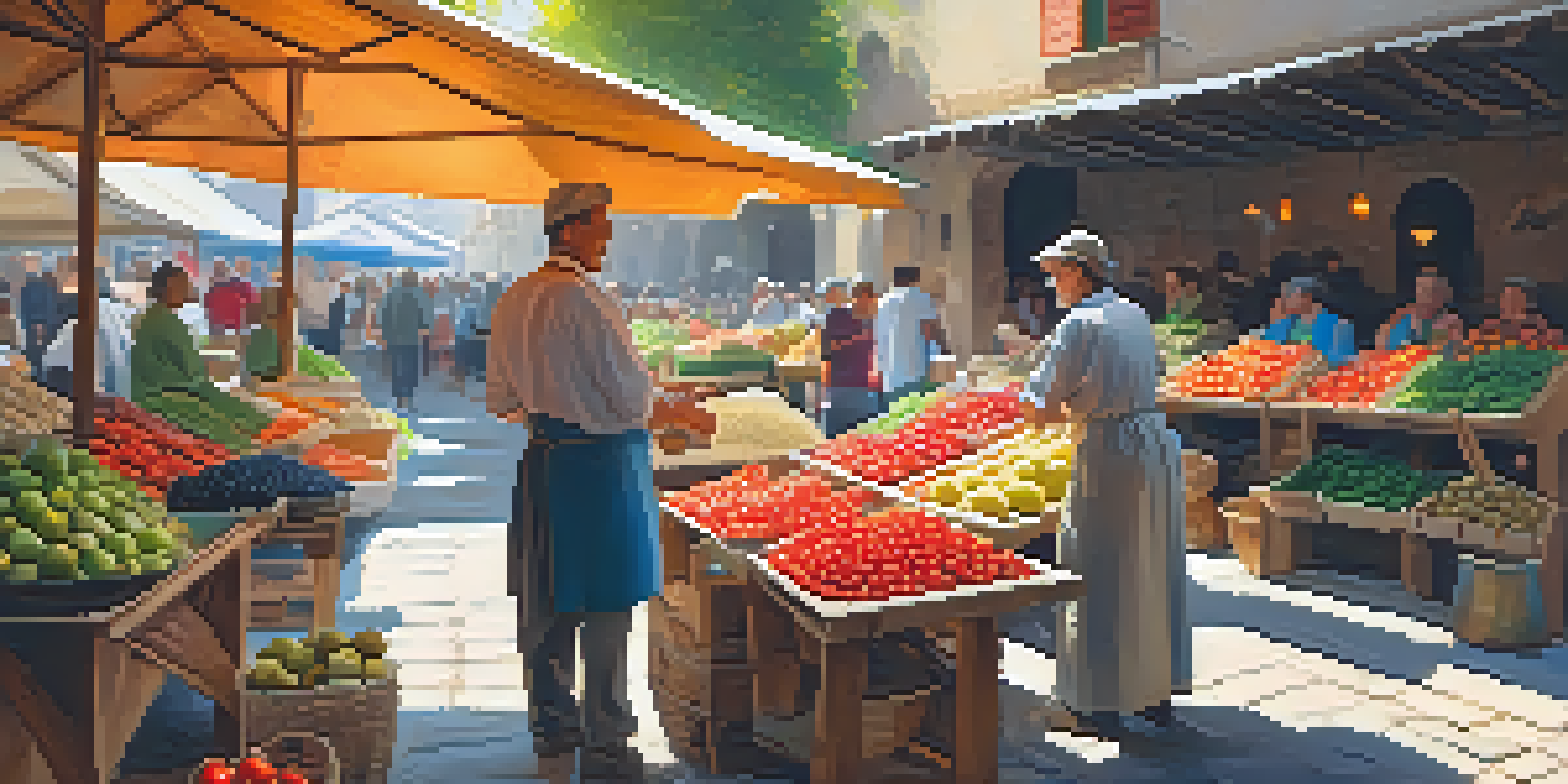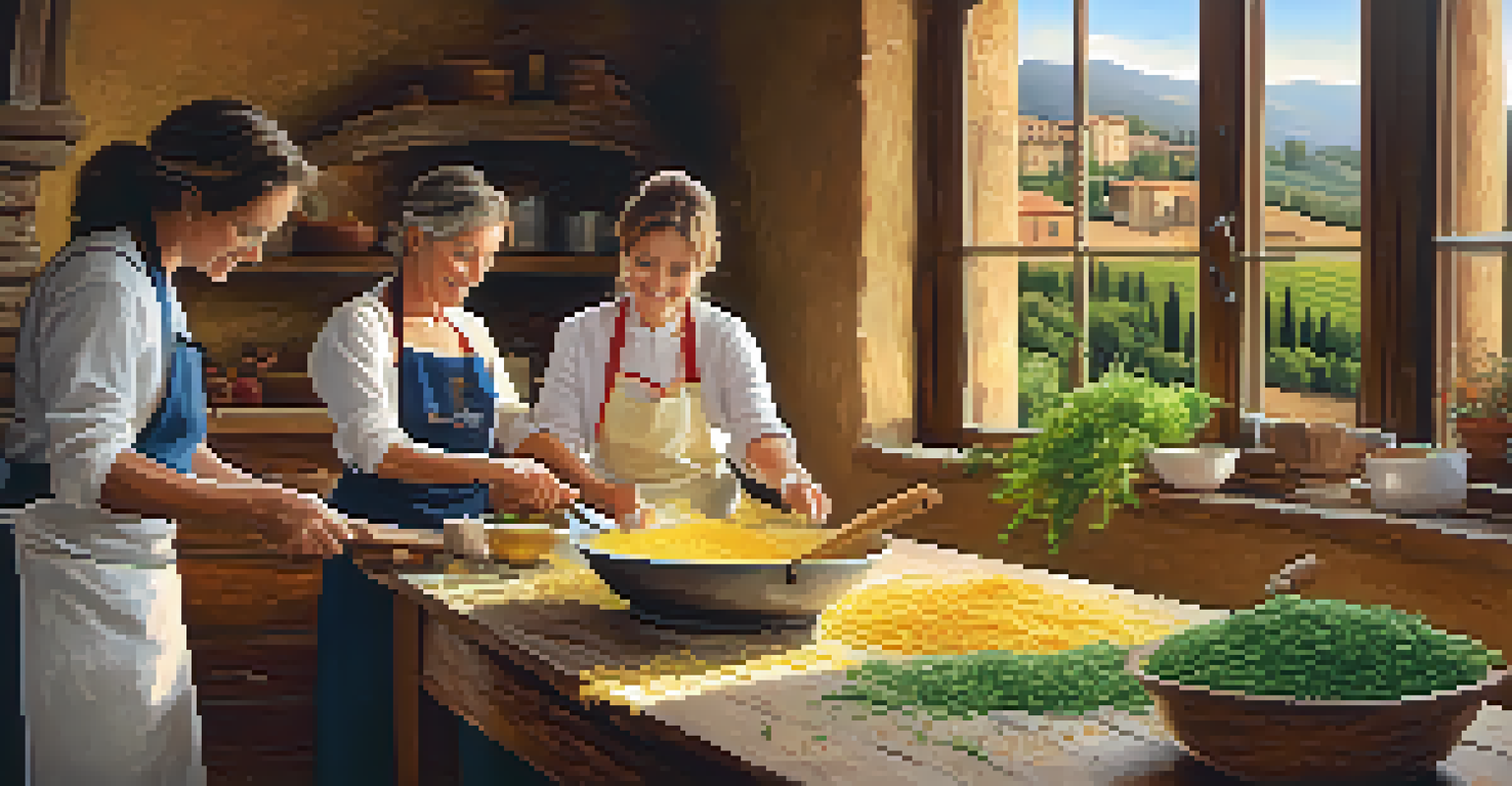Culinary Tours: Taste Your Way Through Local Cultures

What Are Culinary Tours and Why They Matter
Culinary tours are immersive experiences that allow you to explore a destination through its food. These tours can include cooking classes, market visits, and tastings, showcasing the unique flavors and traditions of a region. They matter because food is often a reflection of culture, history, and community, making it a vital part of travel.
Food is our common ground, a universal experience.
When you embark on a culinary tour, you’re not just tasting dishes; you’re discovering stories behind them. Each bite can tell you about local ingredients, traditional cooking methods, and the people who have kept these practices alive. This connection to food helps travelers appreciate the culture on a deeper level.
Imagine savoring a dish that has been passed down through generations, all while learning about the local customs and rituals associated with it. Culinary tours foster a sense of connection, not just to the food, but to the community and its heritage, enriching your travel experience.
Top Destinations for Culinary Tours
Some destinations are renowned for their culinary tours, each offering unique flavors and experiences. For instance, Italy is famous for its pasta-making classes in Tuscany, where you can learn to create authentic Italian dishes from scratch. Similarly, Thailand's vibrant street food scene provides an exciting backdrop for food lovers to explore local flavors.

In Mexico, culinary tours often include visits to local markets, where you can sample fresh ingredients and learn about traditional cooking techniques. These experiences allow travelers to engage directly with local chefs and vendors, enhancing their understanding of the cuisine. Every destination brings its own twist, making culinary tours a diverse adventure.
Culinary Tours Connect Culture and Food
These immersive experiences allow travelers to explore a region's culture and traditions through its unique cuisine.
Don’t overlook Japan, where you can participate in sushi-making workshops in Tokyo or indulge in kaiseki dining in Kyoto. Each location offers not just food but a journey through history and culture, highlighting how deeply intertwined gastronomy is with local identity.
How to Choose the Right Culinary Tour
Choosing the right culinary tour can feel overwhelming, but it’s all about aligning the experience with your interests. Start by considering what cuisines excite you most—are you a fan of spicy dishes, or do you prefer rich, savory flavors? This can help narrow down your options.
Cooking is like love. It should be entered into with abandon or not at all.
Next, think about the type of experience you want. Do you prefer hands-on cooking classes where you can get your hands dirty, or would you rather enjoy guided tastings at famous restaurants? Each tour varies in format, so it's essential to select one that suits your style.
Lastly, read reviews and seek recommendations from fellow travelers. Authenticity is key in culinary tours, so look for experiences led by local experts who can provide insights and stories that you won’t find in a guidebook.
The Role of Local Guides in Culinary Tours
Local guides are the heart and soul of culinary tours, bringing invaluable knowledge and passion to the experience. They offer insights that transform a simple meal into a rich narrative about culture and history. Their connections in the community often lead to hidden gems that tourists might otherwise miss.
Having a local guide means you get to ask questions and engage in conversations that deepen your appreciation of the cuisine. Whether it’s learning about the significance of a particular dish or discovering how a recipe has evolved over time, these interactions can make your culinary adventure truly memorable.
Local Guides Enhance Culinary Experiences
Local guides provide valuable insights and personal stories that deepen your appreciation of the food and its cultural significance.
Moreover, local guides often share personal anecdotes that connect you with the culture on a human level. This storytelling aspect not only enriches the experience but also fosters a sense of belonging, making you feel like an insider rather than just a visitor.
Culinary Tours: A Feast for All Senses
Culinary tours are not only about taste; they engage all your senses. The vibrant colors of fresh produce, the enticing aromas of spices, and the sounds of sizzling pans all contribute to a rich, immersive experience. This sensory engagement is what makes these tours so captivating.
As you explore local markets or dine at street stalls, you’ll find that each ingredient has its own story, and every dish is a work of art. This connection to the senses enhances your understanding of the region's culinary landscape and creates lasting memories.
Imagine walking through a bustling market, the air filled with the scent of herbs and spices, and tasting a dish that bursts with flavor. These moments become cherished experiences, allowing you to carry a piece of the culture with you long after the tour ends.
Sustainable Culinary Tours: Eating with Purpose
Sustainable culinary tours focus on responsible and eco-friendly practices, allowing travelers to enjoy local cuisine while supporting the community. These tours often emphasize farm-to-table dining and promote the use of local ingredients, reducing the carbon footprint associated with food transportation.
By participating in sustainable culinary tours, you contribute to the preservation of culinary traditions and support local economies. This approach fosters a deeper appreciation for the food, as you learn about the origins of the ingredients and the people behind them.
Sustainable Tours Support Local Communities
By focusing on eco-friendly practices and local ingredients, sustainable culinary tours promote responsible tourism while preserving culinary traditions.
Moreover, sustainable tours often include educational components, such as lessons on how to cook with seasonal ingredients or how to minimize food waste. This mindful approach to eating not only enhances your travel experience but also encourages a more conscientious lifestyle.
Creating Lasting Memories Through Food
Culinary tours have a unique way of creating lasting memories that go beyond just the food. Sharing a meal with locals, learning to cook a traditional dish, or even participating in a festive food celebration can forge connections that stay with you long after your journey is over. These experiences often become the stories you tell for years to come.
Food has a remarkable ability to bring people together, and culinary tours are no exception. Whether it's bonding with fellow travelers over a shared dish or exchanging smiles with a local chef, these interactions create a sense of community and belonging.

So, as you plan your next culinary adventure, remember that it’s not just about eating; it’s about experiencing life through the lens of food. Embrace the flavors, the stories, and the friendships that come with every bite, and you’ll find that these moments become cherished memories.